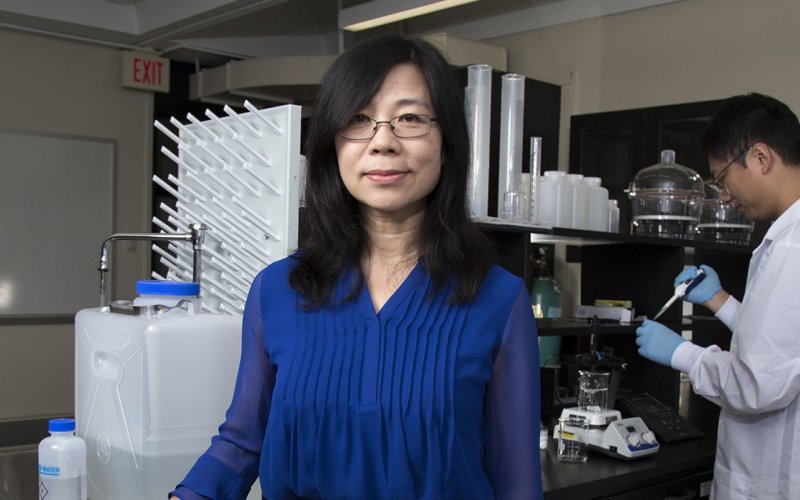UAlbany Innovators Flourish at SUNY Startup Summer School

ALBANY, N.Y. (Sept. 9, 2021) – Regenerative engineering, Alzheimer’s diagnostics and heat-resistant polymers are distinctive fields of study, but they share one thing in common: Researchers at UAlbany are exploring methods to bring these technologies to market in new and unique ways.
Tatyana Tarasevich, a doctoral student in chemistry, Yanna Liang, professor and chair of Environmental and Sustainable Engineering, and Alex Lednev, co-founder and CEO of Early Alzheimer’s Diagnostics LLC, a University spinoff, recently took part in the SUNY Startup Summer School (S4).
As part of the program, each presented their findings before SUNY Venture Advisors at the summer school’s “demo day,” where participants pitch their technologies to successful entrepreneurs and executives for a chance to earn a Technology Accelerator Fund investment.
The program, operated through the SUNY Research Foundation, included 150 faculty, students and staff from 22 SUNY campuses.
Regenerative Engineering — the focus of Liang’s research — tfocuses on providing technologies and services to address challenges facing our society.
“Human beings are used to grab natural resources, use them and then discard the wastes at places that are far away. This includes sewage sludge,” said Liang. “Considering global warming and limited space for landfills, innovative solutions are urgently needed to tackle the waste disposal issue. My solution is to convert waste to treasure through regenerative engineering.”
In 2016, wastewater treatment plants in the U.S. generated around 15 million dry tons of wastewater residuals, of which 68 percent was landfilled. Globally, food waste is predicted to increase from 1.3 to 2.5 billion tons per year by 2025. For the U.S., among 15 million dry tons, around 58 percent was sent to landfills.
Liang’s research team has been developing methods to convert waste into high-value products. This includes a $3.4M project through the U.S. Department of Energy that UAlbany leads, with partners at the University of Michigan, Argonne National Laboratory and Princeton University.
Lednev, the son of UAlbany Professor of Chemistry Igor Lednev, has been leading efforts to commercialize novel technology that can be used as a screening test for Alzheimer’s disease based on the analysis of saliva. The saliva test is very quick and based on Raman spectroscopy and machine learning.
“The method allows not only for detecting Alzheimer’s at advanced stages, but also determining the stage of the disease including that at the very early development of the disease. There is no cure for Alzheimer’s at the moment, but there are already methods for delaying its development,” said Igor Lednev.
Unfortunately, the latter methods have significant side effects. Therefore, the early diagnostics of Alzheimer’s is crucial to slowing its progress.
Tarasevich recently started her cleantech company, SFluor, to market a new, super-hard, heat-resistant photocuring polymer that is three times stronger than others in its class. She was inspired to start SFluor after discovering a novel visible light-promoted photopolymer while working in her lab under the guidance of Professor and Chair of Chemistry John T. Welch, where she is progressing toward her PhD.
“SFluor dries quickly under normal light without the need for expensive lighting arrays or additional chemicals and it can also be fine-tuned for a range of high-performance aviation and aerospace applications – ideal for firms seeking an environmentally clean, cost saving material,” said Tarasevich during the presentation process.
This summer, Tarasevich participated both in the SUNY Startup Summer School program as well as a LaunchPad Fellowship, part of the campus-based Blackstone LaunchPad program to support young entrepreneurs.




